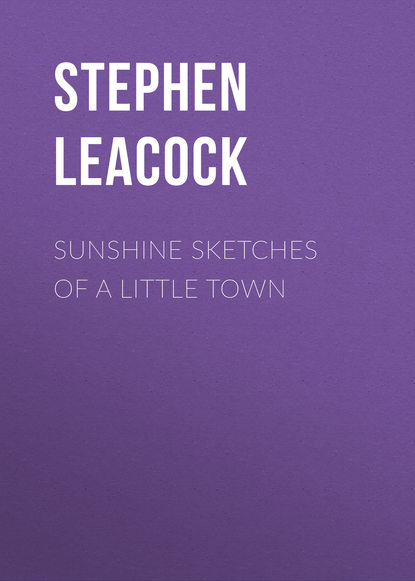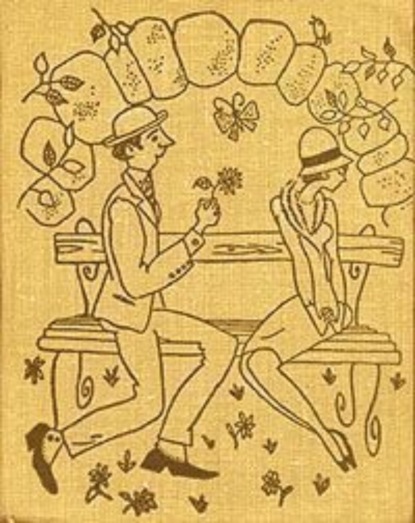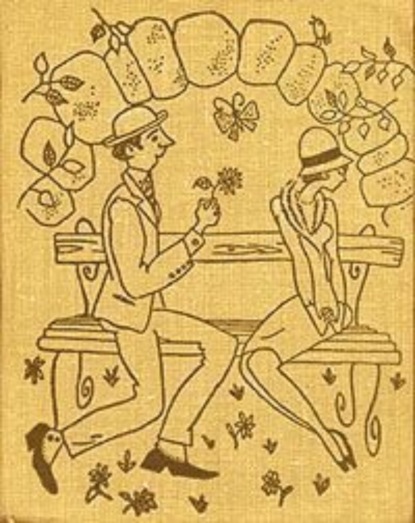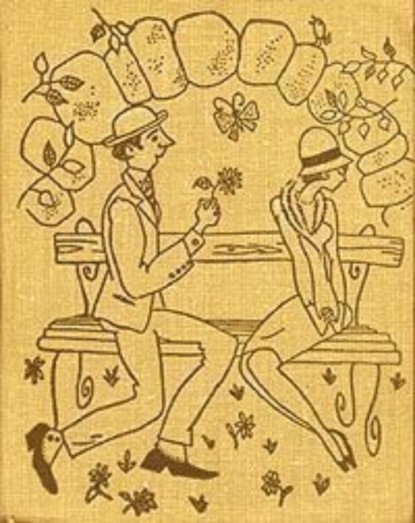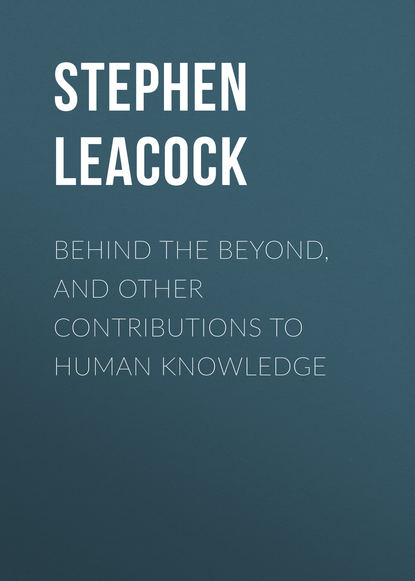 Полная версия
Полная версияПолная версия:
Стивен Батлер Ликок Behind the Beyond, and Other Contributions to Human Knowledge
- + Увеличить шрифт
- - Уменьшить шрифт

Stephen Leacock
Behind the Beyond, and Other Contributions to Human Knowledge
BEHIND THE BEYOND
A Modern Problem Play
Act I.—Behind the Beyond
THE curtain rises, disclosing the ushers of the theater still moving up and down the aisles. Cries of "Program!" "Program!" are heard. There is a buzz of brilliant conversation, illuminated with flashes of opera glasses and the rattle of expensive jewelry.
Then suddenly, almost unexpectedly, in fact just as if done, so to speak, by machinery, the lights all over the theater, except on the stage, are extinguished. Absolute silence falls. Here and there is heard the crackle of a shirt front. But there is no other sound.
In this expectant hush, a man in a check tweed suit walks on the stage: only one man, one single man. Because if he had been accompanied by a chorus, that would have been a burlesque; if four citizens in togas had been with him, that would have been Shakespeare; if two Russian soldiers had walked after him, that would have been melodrama. But this is none of these. This is a problem play. So he steps in alone, all alone, and with that absolute finish of step, that ability to walk as if,—how can one express it?—as if he were walking, that betrays the finished actor.
He has, in fact, barely had time to lay down his silk hat, when he is completely betrayed. You can see that he is a finished actor—finished about fifteen years ago. He lays the hat, hollow side up, on the silk hat table on the stage right center—bearing north, northeast, half a point west from the red mica fire on the stage which warms the theater.
All this is done very, very quietly, very impressively. No one in the theater has ever seen a man lay a silk hat on a table before, and so there is a breathless hush. Then he takes off his gloves, one by one, not two or three at a time, and lays them in his hat. The expectancy is almost painful. If he had thrown his gloves into the mica fire it would have been a relief. But he doesn't.
The man on the stage picks up a pile of letters from the letter department of the hat table. There are a great many of these letters, because all his business correspondence, as well as his private letters, are sent here by the General Post Office. Getting his letters in this way at night, he is able to read them like lightning. Some of them he merely holds upside down for a fraction of a second.
Then at last he speaks. It has become absolutely necessary or he wouldn't do it. "So—Sao Paolo risen two—hum—Rio Tinto down again—Moreby anxious, 'better sell for half a million sterling'—hum . . ."
(Did you hear that? Half a million sterling and he takes it just as quietly as that. And it isn't really in the play either. Sao Paolo and Rio Tinto just come in to let you know the sort of man you're dealing with.)
"Lady Gathorne—dinner—Thursday the ninth—lunch with the Ambassador—Friday the tenth."
(And mind you even this is just patter. The Ambassador doesn't come into the play either. He and Lady Gathorne are just put in to let the people in the cheaper seats know the kind of thing they're up against.)
Then the man steps across the stage and presses a button. A bell rings. Even before it has finished ringing, nay, just before it begins to ring, a cardboard door swings aside and a valet enters. You can tell he is a valet because he is dressed in the usual home dress of a stage valet.
He says, "Did you ring, Sir John?"
There is a rustle of programs all over the house. You can hear a buzz of voices say, "He's Sir John Trevor." They're all on to him.
When the valet says, "Did you ring, Sir John," he ought to answer, "No, I merely knocked the bell over to see how it would sound," but he misses it and doesn't say it.
"Has her ladyship come home?"
"Yes, Sir John."
"Has any one been here?"
"Mr. Harding, Sir John."
"Any one else?"
"No, Sir John."
"Very good."
The valet bows and goes out of the cardboard door, and everybody in the theater, or at least everybody in the seats worth over a dollar, knows that there's something strange in the relations of Lady Cicely Trevor and Mr. Harding. You notice—Mr. Harding was there and no one else was there. That's enough in a problem play.
The double door at the back of the stage, used only by the principal characters, is opened and Lady Cicely Trevor enters. She is young and very beautiful, and wears a droopy hat and long slinky clothes which she drags across the stage. She throws down her feather hat and her crêpe de what-you-call-it boa on the boa stand. Later on the valet comes in and gathers them up. He is always gathering up things like this on the stage—hats and boas and walking sticks thrown away by the actors,—but nobody notices him. They are his perquisites.
Sir John says to Lady Cicely, "Shall I ring for tea?"
And Lady Cicely says, "Thanks. No," in a weary tone.
This shows that they are the kind of people who can have tea at any time. All through a problem play it is understood that any of the characters may ring for tea and get it. Tea in a problem play is the same as whisky in a melodrama.
Then there ensues a dialogue to this effect: Sir John asks Lady Cicely if she has been out. He might almost have guessed it from her coming in in a hat and cloak, but Sir John is an English baronet.
Lady Cicely says, "Yes, the usual round," and distributes a few details about Duchesses and Princesses, for the general good of the audience.
Then Lady Cicely says to Sir John, "You are going out?"
"Yes, immediately."
"To the House, I suppose."
This is very impressive. It doesn't mean, as you might think, the Workhouse, or the White House, or the Station House, or the Bon Marché. It is the name given by people of Lady Cicely's class to the House of Commons.
"Yes. I am extremely sorry. I had hoped I might ask to go with you to the opera. I fear it is impossible—an important sitting—the Ministers will bring down the papers—the Kafoonistan business. The House will probably divide in committee. Gatherson will ask a question. We must stop it at all costs. The fate of the party hangs on it."
Sir John has risen. His manner has changed. His look is altered. You can see him alter it. It is now that of a statesman. The technical details given above have gone to his head. He can't stop.
He goes on: "They will force a closure on the second reading, go into committee, come out of it again, redivide, subdivide and force us to bring down the estimates."
While Sir John speaks, Lady Cicely's manner has been that of utter weariness. She has picked up the London Times and thrown it aside; taken up a copy of Punch and let it fall with a thud to the floor, looked idly at a piece of music and decided, evidently, not to sing it. Sir John runs out of technical terms and stops.
The dialogue has clearly brought out the following points: Sir John is in the House of Commons. Lady Cicely is not. Sir John is twenty-five years older than Lady Cicely. He doesn't see—isn't he a fool, when everybody in the gallery can see it?—that his parliamentary work is meaningless to her, that her life is insufficient. That's it. Lady Cicely is being "starved." All that she has is money, position, clothes, and jewelry. These things starve any woman. They cramp her. That's what makes problem plays.
Lady Cicely speaks, very quietly, "Are you taking Mr. Harding with you?"
"Why?"
"Nothing. I thought perhaps I might ask him to take me to the opera. Puffi is to sing."
"Do, pray do. Take Harding with you by all means. Poor boy, do take him with you."
Sir John pauses. He looks at Lady Cicely very quietly for a moment. He goes on with a slight change in his voice.
"Do you know, Cicely, I've been rather troubled about Harding lately. There's something the matter with the boy, something wrong."
"Yes?"
"He seems abstracted, moody—I think, in fact I'm sure that the boy is in love."
"Yes?"
Lady Cicely has turned slightly pale. The weariness is out of her manner.
"Trust the instinct of an old man, my dear. There's a woman in it. We old parliamentary hands are very shrewd, you know, even in these things. Some one is playing the devil with Jack—with Harding."
Sir John is now putting on his gloves again and gathering up his parliamentary papers from the parliamentary paper stand on the left.
He cannot see the change in Lady Cicely's face. He is not meant to see it. But even the little girls in the tenth row of the gallery are wise.
He goes on. "Talk to Harding. Get it out of him. You women can do these things. Find out what the trouble is and let me know. I must help him." (A pause. Sir John is speaking almost to himself—and the gallery.) "I promised his mother when she sent him home, sent him to England, that I would."
Lady Cicely speaks. "You knew Mr. Harding's mother very well?"
Sir John: "Very well."
"That was long ago, wasn't it?"
"Long ago."
"Was she married then?"
"No, not then."
"Here in London?"
"Yes, in London. I was only a barrister then with my way to make and she a famous beauty." (Sir John is speaking with a forced levity that doesn't deceive even the ushers.) "She married Harding of the Guards. They went to India. And there he spent her fortune—and broke her heart." Sir John sighs.
"You have seen her since?"
"Never."
"She has never written you?"
"Only once. She sent her boy home and wrote to me for help. That was how I took him as my secretary."
"And that was why he came to us in Italy two years ago, just after our marriage."
"Yes, that was why."
"Does Mr. Harding know?"
"Know what?"
"That you—knew his mother?"
Sir John shakes his head. "I have never talked with him about his mother's early life."
The stage clock on the mantelpiece begins to strike. Sir John lets it strike up to four or five, and then says, "There, eight o'clock. I must go. I shall be late at the House. Good-by."
He moves over to Lady Cicely and kisses her. There is softness in his manner—such softness that he forgets the bundle of parliamentary papers that he had laid down. Everybody can see that he has forgotten them. They were right there under his very eye.
Sir John goes out.
Lady Cicely stands looking fixedly at the fire. She speaks out loud to herself. "How his voice changed—twenty-five years ago—so long as that—I wonder if Jack knows."
There is heard the ring of a bell off the stage. The valet enters.
"Mr. Harding is downstairs, my lady."
"Show him up, Ransome."
A moment later Mr. Harding enters. He is a narrow young man in a frock coat. His face is weak. It has to be. Mr. Harding is meant to typify weakness. Lady Cicely walks straight to him. She puts her two hands on his shoulders and looks right into his face.
"MY DARLING," she says. Just like that. In capital letters. You can feel the thrill of it run through the orchestra chairs. All the audience look at Mr. Harding, some with opera glasses, others with eyeglasses on sticks. They can see that he is just the sort of ineffectual young man that a starved woman in a problem play goes mad over.
Lady Cicely repeats "My darling" several times. Mr. Harding says "Hush," and tries to disengage himself. She won't let him. He offers to ring for tea. She won't have any. "Oh, Jack," she says. "I can't go on any longer. I can't. When first you loved me, I thought I could. But I can't. It throttles me here—this house, this life, everything–" She has drawn him to a sofa and has sunk down in a wave at his feet. "Do you remember, Jack, when first you came, in Italy, that night, at Amalfi, when we sat on the piazza of the palazzo?" She is looking rapturously into his face.
Mr. Harding says that he does.
"And that day at Fiesole among the orange trees, and Pisa and the Capello de Terisa and the Mona Lisa—Oh, Jack, take me away from all this, take me to the Riviera, among the contadini, where we can stand together with my head on your shoulder just as we did in the Duomo at Milano, or on the piaggia at Verona. Take me to Corfu, to the Campo Santo, to Civita Vecchia, to Para Noia—anywhere–"
Mr. Harding, smothered with her kisses, says, "My dearest, I will, I will." Any man in the audience would do as much. They'd take her to Honolulu.
While she is speaking, Sir John's voice had been heard off the stage. "No, thank you, Ransome, I'll get them myself, I know just where I left them." Sir John enters hurriedly, advances and picks up his papers on the table—turns—and stands–
He sees his wife's attitude and hears her say "Riviera, Amalfi, Orangieri, Contadini and Capello Santo." It is enough. He drops his parliamentary papers. They fall against the fire irons with a crash. These in falling upset a small table with one leg. The ball of wool that is on it falls to the floor. The noise of this disturbs the lovers.
They turn. All three look at one another. For a moment they make a motion as if to ring for tea. Then they stand petrified.
"You!" gasps Lady Cicely. She does this awfully well. Everybody says afterward that it was just splendid when she said "You."
Sir John stands gazing in horror. "Him! My God! He!" Mr. Harding says nothing. He looks very weak.
Lady Cicely unpetrifies first.
She breaks out, speaking through her nostrils. "Yes, I love him, I love him. I'm not ashamed of it. What right have you to deny it me? You gave me nothing. You made me a chattel, a thing–"
You can feel the rustle of indignation through the house at this. To make a woman a thing is the crowning horror of a problem play.
"You starved me here. You throttled me." Lady Cicely takes herself by the neck and throttles herself a little to show how.
"You smothered me. I couldn't breathe—and now I'm going, do you hear, going away, to life, to love, behind the beyond!" She gathers up Mr. Harding (practically) and carries him passionately away. He looks back weakly as he goes.
Sir John has sunk down upon a chair. His face is set.
"Jack," he mutters, "my God, Jack!"
As he sits there, the valet enters with a telegram on a tray.
"A telegram, Sir John."
Sir John (dazed and trying to collect himself), "What?"
"A telegram, sir,—a cablegram."
Sir John takes it, opens it and reads aloud:
"He is dead. My duty is ended. I am coming home—Margaret Harding."
"Margaret coming home. It only needed that—my God."
. . . . . .As he says it, the curtain falls.
The lights flick up. There is a great burst of applause. The curtain rises and falls. Lady Cicely and Mr. Harding and Sir John all come out and bow charmingly. There is no trace of worry on their faces, and they hold one another's hands. Then the curtain falls and the orchestra breaks out into a Winter Garden waltz. The boxes buzz with discussion. Some of the people think that Lady Cicely is right in claiming the right to realize herself: others think that before realizing herself she should have developed herself. Others ask indignantly how she could know herself if her husband refused to let her be herself. But everybody feels that the subject is a delicious one.
Those of the people who have seen the play before very kindly explain how it ends, so as to help the rest to enjoy it. But the more serious-minded of the men have risen, very gently, and are sneaking up the aisles. Their expression is stamped with deep thought as if pondering over the play. But their step is as that of leopards on the march, and no one is deceived as to their purpose.
The music continues. The discussion goes on.
The leopards come stealing back. The orchestra boils over in a cadence and stops. The theater is darkened again. The footlights come on with a flash. The curtain silently lifts, and it is—
Act II.—Six Months Later
THE programs rustle. The people look to see where it is. And they find that it is "An Apartment in Paris." Notice that this place which is used in every problem play is just called An Apartment. It is not called Mr. Harding's Apartment, or an Apartment for which Mr. Harding pays the Rent. Not a bit. It is just an Apartment. Even if it were "A Apartment" it would feel easier. But "An Apartment"!! The very words give the audience a delicious shiver of uncomfortableness.
When the curtain rises it discloses a French maid moving about the stage in four-dollar silk stockings. She is setting things on a little table, evidently for supper. She explains this in French as she does it, so as to make it clear.
"Bon! la serviette de monsieur! bon! la serviette de madame, bien—du champagne, bon! langouste aux champignons, bien, bon.—" This is all the French she knows, poor little thing, but langouste aux champignons beats the audience, so she is all right.
Anyway, this supper scene has to come in. It is symbolical. You can't really show Amalfi and Fiesole and the orange trees, so this kind of supper takes their place.
As the maid moves about there is a loud knock at the cardboard door of the apartment. A man in official clothes sticks his head in. He is evidently a postal special messenger because he is all in postal attire with a postal glazed hat.
"Monsieur Arrding?" he says.
"Oui."
"Bon! Une lettre."
"Merci, monsieur." He goes out. The audience feel a thrill of pride at having learned French and being able to follow the intense realism of this dialogue. The maid lays the letter on the supper table.
Just as she does it the door opens and there enter Mr. Harding and Lady Cicely. Yes, them. Both of them. The audience catches it like a flash. They live here.
Lady Cicely throws aside her cloak. There is great gaiety in her manner. Her face is paler. There is a bright spot in each cheek. Her eyes are very bright.
There follows the well-known supper scene. Lady Cicely is very gay. She pours champagne into Mr. Harding's glass. They both drink from it. She asks him if he is a happy boy now. He says he is. She runs her fingers through his hair. He kisses her on the bare shoulder. This is also symbolic.
Lady Cicely rattles on about Amalfi and Fiesole. She asks Mr. Harding if he remembers that night in the olive trees at Santa Clara, with just one thrush singing in the night sky. He says he does. He remembers the very thrush. You can see from the talk that they have been all over Baedeker's guide to the Adriatic.
At times Lady Cicely's animation breaks. She falls into a fit of coughing and presses her hand to her side. Mr. Harding looks at her apprehensively. She says, "It is nothing, silly boy, it will be gone in a moment." It is only because she is so happy.
Then, quite suddenly, she breaks down and falls at Mr. Harding's knees.
"Oh, Jack, Jack, I can't stand it! I can't stand it any longer. It is choking me!"
"My darling, what is it?"
"This, all this, it is choking me—this apartment, these pictures, the French maid, all of it. I can't stand it. I'm being suffocated. Oh, Jack, take me away—take me somewhere where it is quiet, take me to Norway to the great solemn hills and the fjords–"
Then suddenly Mr. Harding sees the letter in its light blue envelope lying on the supper table. It has been lying right beside him for ten minutes. Everybody in the theater could see it and was getting uncomfortable about it. He clutches it and tears it open. There is a hunted look in his face as he reads.
"What is it?"
"My mother—good God, she is coming. She is at the Bristol and is coming here. What can I do?"
Lady Cicely is quiet now.
"Does she know?"
"Nothing, nothing."
"How did she find you?"
"I don't know. I can't imagine. I knew when I saw in the papers that my father was dead that she would come home. But I kept back the address. I told the solicitors, curse them, to keep it secret."
Mr. Harding paces the stage giving an imitation of a weak man trapped. He keeps muttering, "What can I do?"
Lady Cicely speaks very firmly and proudly. "Jack."
"What?"
"There is only one thing to do. Tell her."
Mr. Harding, aghast, "Tell her?"
"Yes, tell her about our love, about everything. I am not ashamed. Let her judge me."
Mr. Harding sinks into a chair. He keeps shivering and saying, "I tell you, I can't; I can't. She wouldn't understand." The letter is fluttering in his hand. His face is contemptible. He does it splendidly. Lady Cicely picks the letter from his hand. She reads it aloud, her eyes widening as she reads:
Hotel Bristol, Paris.
My Darling Boy:
I have found you at last—why have you sought to avoid me? God grant there is nothing wrong. He is dead, the man I taught you to call your father, and I can tell you all now. I am coming to you this instant.
Margaret Harding.Lady Cicely reads, her eyes widen and her voice chokes with horror.
She advances to him and grips his hand. "What does it mean, Jack, tell me what does it mean?"
"Good God, Cicely, don't speak like that."
"This—these lines—about your father."
"I don't know what it means—I don't care—I hated him, the brute. I'm glad he's dead. I don't care for that. But she's coming here, any minute, and I can't face it."
Lady Cicely, more quietly, "Jack, tell me, did my—did Sir John Trevor ever talk to you about your father?"
"No. He never spoke of him."
"Did he know him?"
"Yes—I think so—long ago. But they were enemies—Trevor challenged him to a duel—over some woman—and he wouldn't fight—the cur."
Lady Cicely (dazed and aghast)—"I—understand—it—now." She recovers herself and speaks quickly.
"Listen. There is time yet. Go to the hotel. Go at once. Tell your mother nothing. Nothing, you understand. Keep her from coming here. Anything, but not that. Ernestine,"—She calls to the maid who reappears for a second—"a taxi—at once."
She hurriedly gets Harding's hat and coat. The stage is full of bustle. There is a great sense of hurry. The audience are in an agony for fear Ernestine is too slow, or calls a four-wheel cab by mistake. If the play is really well put on, you can presently hear the taxi buzzing outside. Mr. Harding goes to kiss Lady Cicely. She puts him from her in horror and hastens him out.
She calls the maid. "Ernestine, quick, put my things, anything, into a valise."
"Madame is going away!"
"Yes, yes, at once."
"Madame will not eat?"
"No, no."
"Madame will not first rest?" (The slow comprehension of these French maids is something exasperating.) "Madame will not await monsieur?
"Madame will not first eat, nor drink—no? Madame will not sleep?"
"No, no—quick, Ernestine. Bring me what I want. Summon a fiacre. I shall be ready in a moment." Lady Cicely passes through a side door into an inner room.
She is scarcely gone when Mrs. Harding enters. She is a woman about forty-five, still very beautiful. She is dressed in deep black.
(The play is now moving very fast. You have to sit tight to follow it all.)
She speaks to Ernestine. "Is this Mr. Harding's apartment?"
"Yes, madame."
"Is he here?" She looks about her.
"No, madame, he is gone this moment in a taxi—to the Hotel Bristol, I heard him say."
Mrs. Harding, faltering. "Is—any one—here?"
"No, madame, no one—milady was here a moment ago. She, too, has gone out." (This is a lie but of course the maid is a French maid.)
"Then it is true—there is some one–" She is just saying this when the bell rings, the door opens and there enters—Sir John Trevor.
"You!" says Mrs. Harding.
"I am too late!" gasps Sir John.
She goes to him tremblingly—"After all these years," she says.
"It is a long time."
"You have not changed."
She has taken his hands and is looking into his face, and she goes on speaking. "I have thought of you so often in all these bitter years—it sustained me even at the worst—and I knew, John, that it was for my sake that you had never married–"
Then, as she goes on talking, the audience realize with a thrill that Mrs. Harding does not know that Sir John married two years ago, that she has come home, as she thought, to the man who loved her, and, more than that, they get another thrill when they realize that Lady Cicely is learning it too. She has pushed the door half open and is standing there unseen, listening. She wears a hat and cloak; there is a folded letter in her hand—her eyes are wide. Mrs. Harding continues:
